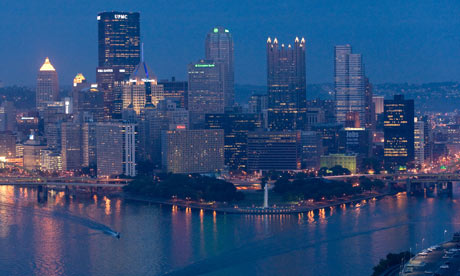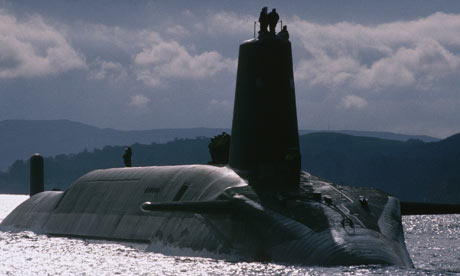
Iran's new nuclear plant was built in line with UN regulations, President Mahmoud Ahmadinejad claimed on Friday, as Western powers accused Tehran of "breaking" every rule of international behaviour.
By Alex Spillius and Andrew Porter in Pittsburgh and David Blair
Published: 7:30AM BST 26 Sep 2009
America, Britain and France raised the prospect of new, tough sanctions after Tehran was forced to admit that its experts have secretly constructed a highly sensitive nuclear plant.
This facility, buried in a mountain outside the city of Qom, is designed to enrich uranium and could be used to produce the essential material for a nuclear weapon. Iran chose to admit its existence shortly before President Barack Obama, Gordon Brown and President Nicolas Sarkozy of France made a joint appearance at the start of the G20 summit in Pittsburgh.
The three leaders chose to maximise the pressure on Mr Ahmadinejad’s regime. “Iran is breaking rules that all nations must follow,” said Mr Obama, adding that Iran was “endangering the global non-proliferation regime and threatening the stability and security of the region and the world”.
“The level of deception by the Iranian government and the scale of what we believe is the breach of international commitments will shock and anger the entire international community,” said Mr Brown. He added there was “no choice but to draw a line in the sand”.
The secret facility, which Western intelligence agencies discovered some months ago, is due to become operational next year. The plant is large enough to hold 3,000 centrifuges, the machines used to enrich uranium. A clandestine facility of this kind, beyond the reach of inspectors from the International Atomic Energy Agency, would be enough to produce sufficient weapons-grade uranium for one nuclear bomb in about a year.
Mr Obama pointed out that the “size and configuration of this facility is inconsistent with a peaceful programme”. Privately, Western officials pointed out the plant is too small to produce enriched uranium for a civil nuclear power station - but just large enough to make enough weapons-grade material for a bomb every year.
A US official said the facility was located 120 miles south-west of Tehran, in a network of underground tunnels found beneath a military base once used as a missile test site by the Revolutionary Guards.
Mr Obama said Iran “must come clean” about its nuclear ambitions at the meeting next week in Geneva. “I won’t speculate on what course of action we will take, we are going to give Oct 1 a chance,” he said, repeating his position that the use of force against Iran would not be ruled out.
Iran’s chief negotiator will meet an American official along with representatives of Britain, France, Germany, China and Russia in Geneva. Unless this meeting yields real progress, America and her allies are likely to table a new resolution before the Security Council imposing more economic sanctions on Iran.
Mr Sarkozy set a deadline of December for Iran to show a change of heart or incur more sanctions. He said Iran must “put everything on the table” at the meeting on Oct 1. “What has been revealed today is exceptional,” said Mr Sarkozy. “We can’t let the Iranian leaders gain time while the motors are running.”
American officials said that Mr Obama had shared the intelligence about the nuclear facility’s existence with President Hu Jintao of China and President Dmitry Medvedev of Russia on the margins of the General Assembly in New York. Iran then learned of the discovery of its plant and chose to come clean in a letter to Mohammed ElBaradei, the head of the IAEA.
A spokesman for Mr Medvedev said that he was “alarmed” by the development. Earlier, Russia’s leader had publicly softened his country’s once implacable opposition to imposing more sanctions on Iran.
America and her allies united to demand that Iran allow IAEA inspectors to visit the new facility. Ma Zhaoxu, a Chinese foreign ministry spokesman, said that Beijing supported this request.
The enrichment plant was uncovered by British, French and American intelligence agencies. One source credited MI6 with “a very big part” in establishing exactly what was going on beneath the mountain north-east of Qom.
The source stressed how the existence of the plant undermined Iran’s constant claim that its nuclear programme is solely for electricity generation. This formerly clandestine facility is of the right size to produce weapons-grade uranium for a bomb.
Iran has previously been caught with designs on how to build nuclear warheads and the existence of its declared enrichment facility in Natanz only emerged in 2002. Gordon Brown said this occasion marked the “third time they have been caught red handed not telling the truth”.

![[02.jpg]](https://blogger.googleusercontent.com/img/b/R29vZ2xl/AVvXsEgHMjgGynglXHcrtfm4y1IT2kh-fyT8PjDnMFp5y1ubLoVPN9yR-oXcRmsEiyx723XwsBkomudpvrTIibChfoncmNEV0Y44aqUKNBhyiqrMtRe4xDDuZEdL6Yc9lENIU1rN8728O1IaJVc/s1600/02.jpg) CHICAGO -- Cruise operator Carnival Corp. said increased summer bookings from last-minute getaway seekers combined with falling fuel costs to help it beat third-quarter profit forecasts.
CHICAGO -- Cruise operator Carnival Corp. said increased summer bookings from last-minute getaway seekers combined with falling fuel costs to help it beat third-quarter profit forecasts.






















